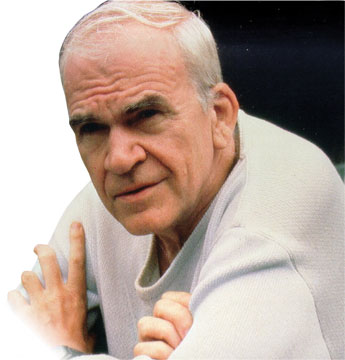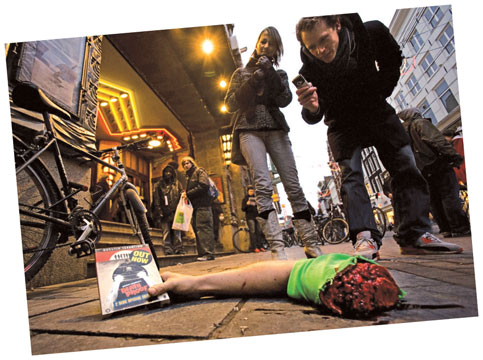|
The Kunderian theory of 'Imagology' cinematically
manifested:
Conceptual aspects of the Sri Lankan film Guerrilla Marketing
By Dilshan BOANGE
Cinematic creations appealing to mass audiences with a strongly built
line of entertaining storytelling with provision for 'food for thought'
into aspects of contemporary human behaviour and the complexities of the
human psyche are not produced in abundance in Sri Lanka.
Films that can spur the general moviegoer to start thinking deeper
into what can be deciphered from the fabric of moving images syncing
with audio elements to speak and perhaps enlighten them about the
society they inhabit and the individual human psyche, can be appreciated
from many aspects as a work that reflects the contemporary state of
things.
 Works that can skilfully reflect the milieu of the age while not
bombarding a general audience viewer with too many philosophical and
theoretical aspects in the course of its narrative will no doubt mark
its presence for a value that transcends the mere purpose of
entertainment alone. Works that can skilfully reflect the milieu of the age while not
bombarding a general audience viewer with too many philosophical and
theoretical aspects in the course of its narrative will no doubt mark
its presence for a value that transcends the mere purpose of
entertainment alone.
Imagology
Sri Lankan film director Jayantha Chandrasiri's Guerrilla Marketing
is a film that presents a story which deals with a host of theoretical
elements relating to subjects such as Sociology, Psychology, Psychiatry,
Political Science and so forth while significantly and perhaps one may
even suggest critically depicting realities related to the advertising
industry and its inner workings unseen to the public eye.
The focus of this article's discussion is of the merits the film
carries related to a theorem expounded by the Czech born French author
Milan Kundera whose novels mark an indelible milestone in the
development of postmodern literature in Europe.
In his highly celebrated novel Immortality, Kundera discusses his
theorem of 'Imagology'. It relates very intrinsically to the concept of
propaganda and how advertising plays a role in our daily lives of
influencing the way we think and act and become herded into becoming a
mass that follows the messaging of advertisements that serve the agenda
of those who control mass media and the State.
The example form USSR
Citing examples from the former Soviet Union where the ideology of
Marxism was reduced to a symbolic hammer and sickle to emblemise the
concept of Marxism and the system of Communism, Kundera speaks of how
the masses were moved to obey the controllers of the system. The masses
were exacted of their beliefs to be placed in the images that were
thrust at them through propaganda machinery.
The masses of course were made to believe that realising the concept
of a utopia through the doctrine of Karl Marx means to follow the
instructions of the State that conveyed to them the goal they were
believed to be moving towards, through images such as workers
courageously moving forwards in amity as a united force under the
guidance of a hammer and sickle insignia. The creatively strategised
campaigns would in essence be the constitution of non-verbal messages
through skilful assemblage of 'images'.
Imagology as propounded by Kundera becomes a means to manipulate the
masses through sets of images and symbols that relegate the need to
think and decide for one's own self and erodes the notion of an idea
that is deliberated upon to be the means by which a decision is reached.
It is a means of convenience to direct the masses that in essence
creates a world that relies on media to 'tell them everything' and also
'what to do'. In his novel Kundera discussing Imagology speaks of public
opinion polls and how 'truths' are created to convince the reader,
listener or viewer in to thinking that the actual state of things is
what has been declared by the media. A question raised undeniably is how
truthful is the media and what it delivers to the masses to be trusted
as the truth?
Business of public opinion creation
In the film Guerrilla Marketing the lead male roles are played by
Kamal Addararachchi and Jackson Anthony who portray the characters of
Thisara the advertising maverick and Gregory Mahaadhikaram the Leader of
the Opposition whose presidential election campaign relies heavily on
the advertising concepts of Thisara.
In the scene where the two characters meet for the first time the
Opposition Leader says to Thisara that he isn't scared of public opinion
which according to the politico is something many men in his line of
work are daunted by.
 The reason being that public opinion can now be created by
advertising firms. Here one finds a very salient point of the Kunderian
discourse of how the media becomes the generator of public opinion based
on the trust placed in it by the masses. The reason being that public opinion can now be created by
advertising firms. Here one finds a very salient point of the Kunderian
discourse of how the media becomes the generator of public opinion based
on the trust placed in it by the masses.
The advertising industry creates the message which is disseminated
through print and electronic media which makes them siblings cradled
together within the domain of the 'information business'.
The characteristic of media dependency for information for a society
to be directed is telling of the mediatisation that defines the present
milieu which stands on the revolutions in ICT.
The message that comes clearly through the story of Guerrilla
Marketing is that the media plays a crucial role in shaping public
opinion as well as 'image building'. One of the notable junctures in the
area of image building of a personality and icon creation for the public
domain is the scene of the when the photo shoot of Gregory Mahaadhikaram
for the poster campaign.
The conventional photo shoot which does not develop the desired
effect of dynamism from the subject's demeanour owing to the physical
restrictedness felt by the presidential candidate being garbed in the
typical white national dress turns into a performance of modern dance.
The camera's click frantically and finally Thisara gets the picture
which he feels is what befits the poster image he has in mind.
Striking
What is very strikingly depictive of the Kunderian theorem of
Imagology at practice is how the selected photo of the presidential
candidate who is wearing a black turtle neck shirt is reset with the
typical white Chinese collar long sleeve shirt by the use of computer
software such as Photoshop.
This juncture manifests to a large extent the ideas discussed by
Kundera of how an 'image' is created or laid out to be fed to the
public.
It is very blatantly a manipulation of the true state of things, the
existent state of an entity to be made more public savvy and appealing
from a vantage of popular politics.
Who really was the candidate at the moment he posed for the photo in
terms of his mindset? Was he the public figure clad in white who
addresses public rallies? Or was he a westernised Lankan who was
reliving a moment of exuberance and ecstasy from his young days as a
university student in Chicago Illinois where he had followed a course in
modern dancing? Yet what is offered to the public as an image of a
national minded leader is a concoction of images doctored to project the
intended image to the public and not to portray the real person.
Power of advertising
Advertising is an industry that deals with concepts and how concepts
can be turned into messages for public dissemination through media that
can be static as print and electronic means that can be visually
motional like TV, as well as the media that is solely auditory -Radio.
Advertising creates opinions and can create markets where there really
may not exist any real need for a certain product.
The power of advertising and the role of mass media in forming
opinions and directing the collective senses of a society playing on the
societal common interests, tastes and dislikes held and shared when
forming opinions comes out very pronouncedly in Guerrilla Marketing.
It is an appreciable work of cinema which offers decipherable
elements through the medium of film that relate to the theoretical
grounding expounded by one of the masters of European postmodern
literature, which thus shows an interrelation of cinema and literature
across continents and cultures.
|

